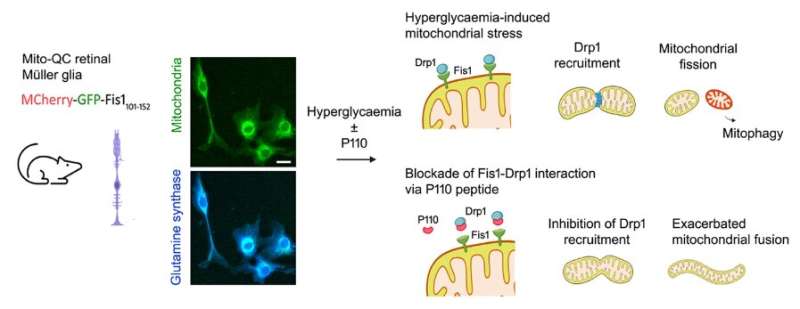This article has been reviewed according to Science X's editorial process and policies. Editors have highlighted the following attributes while ensuring the content's credibility:
fact-checked
trusted source
proofread
Research offers improved understanding of the biology of eye complications caused by diabetes

Advances in understanding the basic biology behind the causes of diabetic retinopathy could have potential therapeutic implications later down the line. A recent paper published by the experimental ophthalmology team at the Institute of Inflammation and Aging in Nature Communications, sheds light on the mechanisms that cause eye damage in as many as 80% of people who have had diabetes for several decades.
Diabetic retinopathy is a complication of diabetes, a result of high blood sugar levels damaging the retina at the back of the eye. It can cause blindness if left undiagnosed and untreated, so regular check-ups are important for diabetic individuals.
Dr. Jose Romero Hombrebueno who led the investigation at the Institute of Inflammation and Aging, University of Birmingham commented, "Since the onset of diabetic retinopathy cannot currently be prevented, there is an urgent need to develop safe and effective therapies for the management of early disease. This work goes some way to doing that by uncovering the mechanisms behind the damage caused by diabetic retinopathy."
Replacing the batteries of the eye
The human body needs energy to work. This energy is produced by small "batteries" inside the cells called mitochondria. In healthy people, damaged mitochondria are removed and quickly replaced by new ones, a little like replacing an ineffective battery. This keeps the body working well, including nerves, blood vessels and the immune system.
However, in diabetes, this process of mitochondrial turnover is impaired. Consequently, damaged mitochondria accumulate in the retina of diabetic people, putting them at risk of vision loss by causing inflammatory and nerve damage.
The researchers used retina samples from diabetic donors and innovative murine models to explore why mitochondrial turnover is impaired in diabetic retinopathy and report that hyperconnectivity in the retina is to blame. By mimicking this process in retinal cells, they also generated a drug discovery platform that suggest that a drug called Kinetin Riboside may be capable of reactivating mitochondrial turnover to improve their function in diabetes.
Early murine studies have shown promise that this drug has potential to prevent nerve deterioration in the retina. Further research would be beneficial, to find out whether this could have potential for treating patients with diabetic retinopathy.
An estimated 537 million around the world are living with diabetes, according to the International Diabetes Federation, this this figure predicted to rise rapidly over the coming decades. Diabetes is a condition where patients' blood sugar levels are too high because they cannot produce enough insulin or the insulin their bodies make is not effective.
More information: Aidan Anderson et al, Relaxation of mitochondrial hyperfusion in the diabetic retina via N6-furfuryladenosine confers neuroprotection regardless of glycaemic status, Nature Communications (2024). DOI: 10.1038/s41467-024-45387-9





















